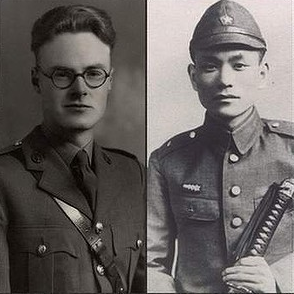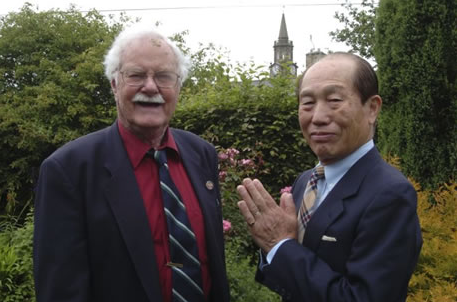Japan’s Ambassador to the UK Keiichi Hayashi provided the byline for this blog – “a new type alliance”, in a speech he gave a few months ago. He said something else in that speech that I thought worth following up, and have only now had a chance:
“By mentioning the Anglo-Japanese Alliance, I am not seeking merely to dwell on past glories. Surely we had the tragedy of another war which we fought against each other and have always to squarely face”
Memories of that past war are being turned into weapons in a new war of global public opinion. China’s Ambassador to Britain wrote a letter to the British newspaper the Telegraph on 1 January 2014, placing the international community on ‘high alert’ because PM Abe is attempting ‘the resurrection of Japanese militarism’. To illustrate his point on the danger of Japanese militarism, Ambassador Liu selected an unusual story to remind the British public about their own experience of war with Japan:
“Next week, The Railway Man, a film based on a true story, will be released. It tells the tragic story of a British PoW tortured by the Japanese in the Second World War. The film is not only about the atrocities committed by his Japanese captors, but also how one of them is harrowed by his own past. His redemption is only effected through deep remorse and penitence”.
That British PoW’s name was Eric Lomax, and he died not long ago during the filming of his story. Eric’s story became more widely known following his dramatic reconciliation with the Japanese soldier who tortured him in Thailand, Nagase Takashi. Through this reconciliation he said he ‘found some kind of peace and resolution‘. When Eric’s wife accompanied him back to the graves of British PoWs who died in the war, she asked if reconciliation with Nagase might be some kind of betrayal. He did not see it that way, replying to her “Patti, some time the hating has to stop”. Finally Patti had those words written on her husband’s grave.
“Some time, the hating has to stop” is is a sentiment notably absent from China and Japan’s latest efforts at public diplomacy. I draw two conclusions from this: (1) This suggests the link China is making between Japan’s wartime aggression and the present disputes is most probably disingenuous, and therefore offensive to the memories of men like Eric Lomax; and (2) Japan is neglecting its history of reconciliation (stories like Takashi’s) as a source of soft power.
In his letter, China’s Ambassador Liu seemed only interested in one aspect of the Lomax/Takashi story, which was the aggression, then remorse and penitence of the Japanese soldier. The importance of forgiveness (by Lomax) perhaps not serving his purpose. Contrary to what seems like an attempt to inspire the British to see China’s side of the argument over Japanese militarism, Amb. Liu inadvertently highlighted the quintessential case of Anglo-Japanese post-war reconciliation.
It is a story, in all its aspects, that Amb. Hayashi would do well to consider, along with his commitment to ‘squarely face’ this history, especially in his response to Amb. Liu. Perhaps because he felt all this was merely a ruse, he chose instead to base his latest defence more on a legal argument. He may succeed in this, but Japan should not disregard the power of such stories to form public opinion and inform policy. Like Takashi Nagase, Japanese leaders have apologised so are present generations not ready to be forgiven? Since China has noted Eric Lomax’s story, can it learn a lesson from him as well?
Amb. Liu said in a BBC interview subsequent to his letter that the reason China cannot talk to Japan about its territorial disputes is because PM Abe visited Yasukuni shrine. A relationship between post-war remorse and contemporary power politics continues to be held against Japan. But Japan has a strong case on both counts, and if this link continues to be sustained the significance of successful Anglo-Japan reconciliation should not be overlooked.



I would take this article a step further and advise the Americans (the government, not the people) that their at some point, their hating of Cuba has to stop.
I have heard the points from both sides. Many years ago I taught English is China. I heard all about how evil the Japanese were/are, and visited museums showing terrible war pictures of Nanjing, etc. Chinese heroes Bruce Lee and Jet Li fought the ‘ruthless’ Japanese in their movies.
Many years later I ended up marrying a Japanese woman. From her perspective, the average Japanese does not think twice about the Chinese, but the Chinese keep reminding them every single opportunity, like when a politician is visiting a war shine (as mentioned in the article), that they are ‘bad’ and need to apologize (even though many apologies are on record). From her point of view, like others, she is tired of the constant harassment, and resents their pettiness.
Over the years I have often told my Chinese and Japanese students and friends that they need to move on, or as the article says “the hating needs to stop.” I told them that my grandfather fought in WWII and lost his brother, but our family did not grow up hating ‘the enemy’ of old.
In my youth I did not think twice about having friends or dating Germans, Italians, Russians, Chinese or of course Japanese. So why is it that a Canadian like myself can easily move on and let sleeping dogs lie, but many other people in China, Japan and Korea cannot? It’s a very interesting cultural question. I think the answer is partly because the horror stories from WWII mostly come from either the Nazis or the Japanese soldiers, and we don’t want to let people forget, in case history tries to repeat itself. In that case, let’s also not forget the horror of the two atomic bombs that were dropped on Japan. Anyway – I will be truly happy when the two sides can move forward in their lives as neighbours, instead of drudging up the past every week. Thanks for the interesting article!
Pingback: Latest developments confirm UK and Japan heading towards a new type of alliance | Anglo-Japan Alliance